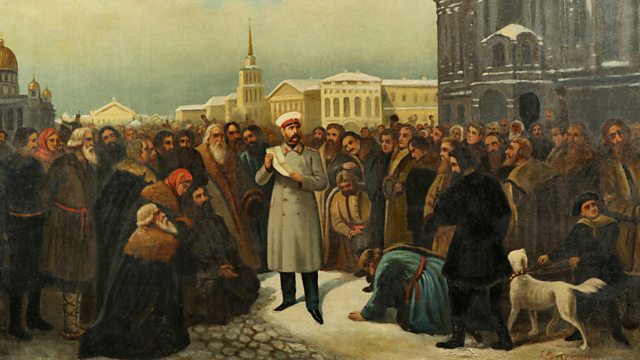The Emancipation of the Serfs
Melvyn Bragg and guests discuss Tsar Alexander II's 1861 decree that freed 30 million Russians from serfdom, an act of reform that followed Russia's defeat in the Crimean War.
Melvyn Bragg and guests discuss the 1861 declaration by Tsar Alexander II that serfs were now legally free of their landlords. Until then, over a third of Russians were tied to the land on which they lived and worked and in practice there was little to distinguish their condition from slavery. Russia had lost the Crimean War in 1855 and there had been hundreds of uprisings, prompting the Tsar to tell the nobles, "The existing condition of owning souls cannot remain unchanged. It is better to begin to destroy serfdom from above than to wait until that time when it begins to destroy itself from below." Reform was constrained by the Tsar's wish to keep the nobles on side and, for the serfs, tied by debt and law to the little land they were then allotted, the benefits were hard to see.
With
Sarah Hudspith
Associate Professor in Russian at the University of Leeds
Simon Dixon
The Sir Bernard Pares Professor of Russian History at UCL
And
Shane O'Rourke
Senior Lecturer in History at the University of York
Producer: Simon Tillotson.
Last on
LINKS AND FURTHER READING
��
READING LIST:
J. Blum, Lord and Peasant in Russia: From the Ninth to the Nineteenth Century (Princeton University Press, 1961)
Anton Chekhov (trans. Ronald Wilks), The Lady with the Little Dog and Other Stories 1896-1904 (Harmondsworth: Penguin 2002), especially the story ‘Peasants’
Fyodor Dostoevsky (trans. David McDuff), The House of the Dead (Penguin, 2004)
Ben Eklof and Stephen P. Frank (eds.), The World of the Russian Peasant: Post-Emancipation Culture and Society (Unwin Hyman, 1990)
T. Emmons, The Russian Landed Gentry and the Peasant Emancipation of 1861 (Cambridge University Press, 1968)
D. Field, End of Serfdom: Nobility and Bureaucracy in Russia, 1855-61 (Harvard University Press, 1976)
Orlando Figes, Natasha’s Dance: A Cultural History of Russia (Allen Lane, 2002)
Cathy A. Frierson, Peasant Icons: Representations of Rural People in Late Nineteenth Century Russia (Oxford University Press, 1993)
Nikolai Gogol (trans. Robert Maguire), Dead Souls (Penguin, 2004)
Geoffrey Hosking, Russia: People and Empire, 1552-1917 (HarperCollins, 1997)
Malcolm V. Jones and Robin Feuer Miller (eds.), The Cambridge Companion to the Classic Russian Novel (Cambridge University Press, 1998)
Peter Kolchin, Unfree Labor: American Slavery and Russian Serfdom (Belknap Press, 1987)
David Moon, The Abolition of Serfdom in Russia: 1762-1907 (Routledge, 2002)
Alexander Nikitenko, Up from Serfdom: My Childhood and Youth in Russia, 1804-1824 (Yale University Press, 2001)
Leo Tolstoy (trans. Louise and Aylmer Maude), War and Peace (Oxford University Press, 2010)
Leo Tolstoy (trans. Louise and Aylmer Maude), The Devil and Other Stories (Oxford University Press, 2003)
Leo Tolstoy (trans. Paul Foote), Master and Man and Other Stories (Penguin, 2005)
Leo Tolstoy (trans. Louise and Aylmer Maude), Plays: The Power of Darkness, The First Distiller, The Fruits of Culture (Elibron Classics, 2004)
��
Credits
| Role | Contributor |
|---|---|
| Presenter | Melvyn Bragg |
| Participant | Sarah Hudspith |
| Participant | Simon Dixon |
| Participant | Shane O'Rourke |
| Producer | Simon Tillotson |
Broadcasts
- Thu 17 May 2018 09:00����ý Radio 4
- Thu 17 May 2018 21:30����ý Radio 4
Featured in...
![]()
19th Century—In Our Time
Browse the 19th Century era within the In Our Time archive.
![]()
History—In Our Time
Historical themes, events and key individuals from Akhenaten to Xenophon.
In Our Time podcasts
Download programmes from the huge In Our Time archive.
The In Our Time Listeners' Top 10
If you’re new to In Our Time, this is a good place to start.
Arts and Ideas podcast
Download the best of Radio 3's Free Thinking programme.
Podcast
-
![]()
In Our Time
Melvyn Bragg and guests discuss the ideas, people and events that have shaped our world.



